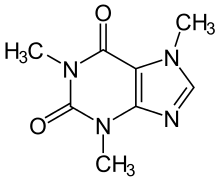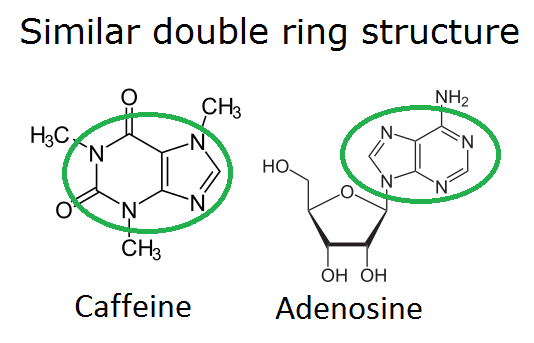Why coffee gets you up and going, and how it can improve your cognition
Coffee. Isn't it great? Nothing like sipping on it and slowly noticing focus and wakefulness washing over you. But why does it do that? Why is it so good?
Caffeine
The main active ingredient in coffee is Caffeine. Caffeine is a psychoactive drug from the stimulant class. The dosage of caffeine in the average cup of coffee is 80-120mg, and it starts to take effect within 30 minutes of you drinking your coffee - it goes to the stomach, enters the bloodstream and from there it goes to the brain.

Caffeine molecule
How it works
To understand how caffeine works, you should first know the basics of how nerve cells function in the brain. In short, the brain contains billions of nerve cells that are constantly interacting with each other. This interaction is done with neurotransmitters - small molecules that are released by one nerve cell in order to communicate with another nerve cell. Neurotransmitters have receptors, which are located on other nerve cells - when the neurotransmitter binds to its receptor on a nerve cell, the message is delivered from the nerve cell that released the neurotransmitter, to the nerve cell that received it.
Caffeine works by disabling the "brakes" of your brain on wakefulness - imagine a wooden block being placed under the brake pedal of your car. Your brain uses a neurotransmitter called Adenosine to modulate nerve cell activity. When a nerve cell releases adenosine, it binds to its receptors on other nerve cells and activates them. When the receptors are activated, the target nerve cell slows down - essentially, adenosine, by binding to its receptors, tells the nerve cell to work more slowly. Adenosine is an inhibitory neurotransmitter - it reduces the activity of a nerve by activating its receptors.
Caffeine is a molecule that has a similar chemical structure to adenosine, and therefore the brain sees it as adenosine. When caffeine enters the brain, it binds to adenosine receptors - the receptors accept the caffeine molecules because it "disguises" as adenosine - since it looks similar to it, the receptors think they just got adenosine. But caffeine is tricky - it is not adenosine, and when it binds to adenosine receptors, it does not activate them, and therefore adenosine's action is prevented - the receptors are occupied by caffeine!

Similarity between caffeine and adenosine molecules
Adenosine is supposed to tell nerve cells to slow down, but it couldn't do so because of the caffeine. The nerve cells don't slow down, and this is what causes caffeine's stimulant effect - caffeine is not actually directly stimulating by increasing activity in the brain, rather it prevents the brain from slowing itself down.
The blockade of adenosine receptors also makes the brain produce adrenalin, which increases heart rate, and even increase the release of dopamine, another neurotransmitter which modulates movement, focus, mood, memory, appetite, motivation and reward. The increase in dopamine levels can lead to euphoria, optimism, enhanced focus and in some cases, an increase or decrease in anxiety.
Caffeine can enhance attention, memory and learning
Caffeine is not only a stimulant that gives you energy, it can in fact enhance attention, memory and learning!
Caffeine does this by making Acetylcholine, a neurotransmitter in the brain, stay around longer than it usually does. Acetylcholine is a neurotransmitter involved in many different functions (as basic as muscle activation), and was also found to be involved in modulating memory, attention and learning, especially in memory encoding.

Acetylcholine molecule
When learning new concepts, acetylcholine is necessary for memory encoding and consolidation - it is involved in the creation of certain pathways in the brain that are related to memory storage. After acetylcholine has done its job, it is cleared up by a protein called Acetylcholinesterase - a long word, isn't it? This protein is an enzyme that destroys acetylcholine.
Caffeine has been found to increase acetylcholine levels in the brain by inhibiting the action of the protein that destroys acetylcholine. An increase in acetylcholine levels can translate into increased memory encoding, since acetylcholine is responsible for memory encoding. This hypothesis has been confirmed by a study which showed that caffeine administration to humans results in increased memory consolidation (long-term memories form more easily) that lasts for 24 hours after caffeine administration.
Acetylcholine, coffee and cognitive decline
Low levels of acetylcholine signaling was found in Alzheimer's and dementia patients, and is linked to cognitive decline. Caffeine, by increasing acetylcholine levels, might be able to protect the brain from cognitive decline. Indeed, researchers have found that drinking coffee is associated with lower rates of dementia and Alzheimer's disease, although it might be related to certain antioxidants in coffee, and not necessarily to the caffeine itself.
Congratulations @superagonist! You have received a personal award!
Click on the badge to view your own Board of Honor on SteemitBoard.
For more information about this award, click here
Congratulations @superagonist! You have received a personal award!
Click on the badge to view your Board of Honor.
Congratulations @superagonist! You received a personal award!
You can view your badges on your Steem Board and compare to others on the Steem Ranking
Vote for @Steemitboard as a witness to get one more award and increased upvotes!